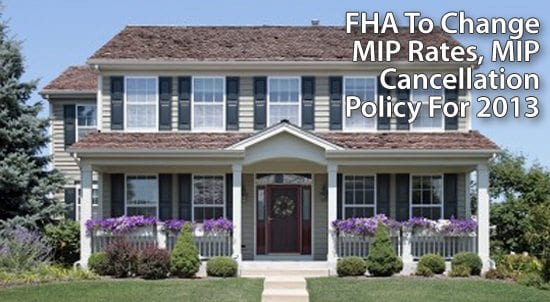
The future of FHA lending may look very different from today with stricter guidelines, tougher loan terms, and an increase to FHA mortgage insurance premiums.
The FHA has put its plan to paper. For this year’s home buyers and would-be refinancing households, the best time to get an FHA-backed mortgage may be now — before the FHA makes its changes “official”.
See today's FHA mortgage rates
.
What Is An FHA Mortgage?
The Federal Housing Administration (FHA) is not a mortgage lender. It’s a government agency which insures mortgage lenders against loan defaults. The FHA maintains “reserves” for paying such claims. The reserves are filled using mortgage insurance premiums (MIP) paid by the nation’s FHA-backed homeowners.
FHA homeowners typically pay an upfront MIP at the time of closing; plus, an ongoing annual premium which is paid to the FHA monthly. These premiums are paid into the Mutual Mortgage Insurance (MMI) Fund.
An FHA-insured mortgage is similar to a conventional one via Fannie Mae or Freddie Mac; or a VA loan backed by the Department of Veterans Affairs.
- Loans are available in various lengths (e.g.; 30 years, 20 years, 15 years)
- Loans are available as fixed-rate mortgages, or adjustable-rate mortgages
- Loans can be made with full cost, low-closing cost, or zero-closing cost options
However, where an FHA-insured mortgage differs from other mortgage types is in its guidelines; the “rulebook” upon which FHA mortgages are approved.
For example, the FHA allows for downpayments of just 3.5 percent whereas conventional financing via Fannie Mae and Freddie Mac typically requires five percent or more.
In addition, the Federal Housing Administration will finance a multi-unit home without “changing” the mortgage rate. With conventional financing, buyers may pay a 1 percent fee against the loan size for that right.
Lastly, the Federal Housing Administration allows for non-traditional credit histories among a host of other guideline differences that make FHA financing unique and favorable to first-time home buyers and move-up buyers alike.
Unfortunately for today’s home buyers and refinancing households, though, the government’s “loose” guidelines appear to have been too loose between the years 2007-2009. High default rates on loans from that period have forced the agency to pay more default claims to lenders than for what was originally planned.
See today's FHA mortgage rates
.
By law, the Federal Housing Administration must maintain a certain, minimum level of funds in the MMI Fund. That minimum is 2%, or $2 for every $100 insured. Today, the FHA has a negative $1.44 for every $100 insured.
That’s not allowed.
So, much like a homeowner insurance company blindsided by a hurricane or natural disaster, the FHA will do more than just raise its mortgage insurance premiums on customers — it will also changs the rules by which its lends.
FHA financing is expected to be a lot less favorable going forward.
See today's FHA mortgage rates
.
FHA To Rebuild Reserves Via Mortgage Insurance Premiums
The FHA is planning to raise its mortgage insurance premiums, and the terms by which you can . It recently released a 63-page document in which the agency outlines its plan to shore up its existing reserve fund deficiency, and to prevent such a deficiency in the future.
The agency outlined several soon-to-be-released changes, including the following :
Mortgage Insurance Premium Increase
The FHA will increase its mortgage insurance premiums by 10 basis points, or 0.1 percentage points, for all new loans. This will raise the annual FHA MIP to as high as 1.25% in most parts of the county, and to 1.60% in cities such as Fairfax and Alexandria, Virginia; Los Angeles, California; and, Potomac and Bethesda, Maryland for homeowners borrowing up to the local limit of $729,750.
FHA MIP May Not Be Canceled After 5 Years, 78% LTV
Returning to its pre-2001 policy, the FHA will no longer cancel FHA MIP once an insured mortgage reaches 78% loan-to-value (LTV). Instead, FHA mortgage insurance will last for the loan’s full lifetime (which can be up to 30 years). The agency is making this change because roughly 12 percent of all FHA default claims occur on loans for which homeowners no longer pay MIP; and because home values are known to rise and fall. By collecting FHA MIP for the full 30 years of a loan, the agency can minimize future loss and more quickly recapitalize its reserve fund.
Incentive-Pricing For Buyers Receiving Housing Counseling
The Federal Housing Administration’s research shows that when a home buyer — particularly a first-time home buyer — partakes in housing counseling service prior to purchase, loan performance improves significantly. Therefore, the FHA is adding new policies which require home buyers to complete a pre-purchase counseling program. Home buyers who skip the housing counseling portion, where allowed, should expect higher mortgage rates from their lender.
The FHA is ready to release at least some of these changes immediately.
See today's FHA mortgage rates
.
Act Quickly For Better FHA Loan Terms
The FHA admits that it will raise its mortgage insurance premiums, and that it will no longer allow for FHA MIP cancellation. For FHA-insured homeowners, these two changes add significant, ongoing costs to the Federal Housing Administration home loan program.
Therefore, if you plan to buy a home with FHA-backed financing this year, or plan to refinance via the , consider changing your time frame for action. The longer you wait, the higher your long-term cost of homeownership is likely to be.
Plus, with mortgage rates rising, conditions are ideal. Get started with an rate quote. See what today’s FHA mortgage rates can do for your budget.
Time to make a move? Let us find the right mortgage for you
.
